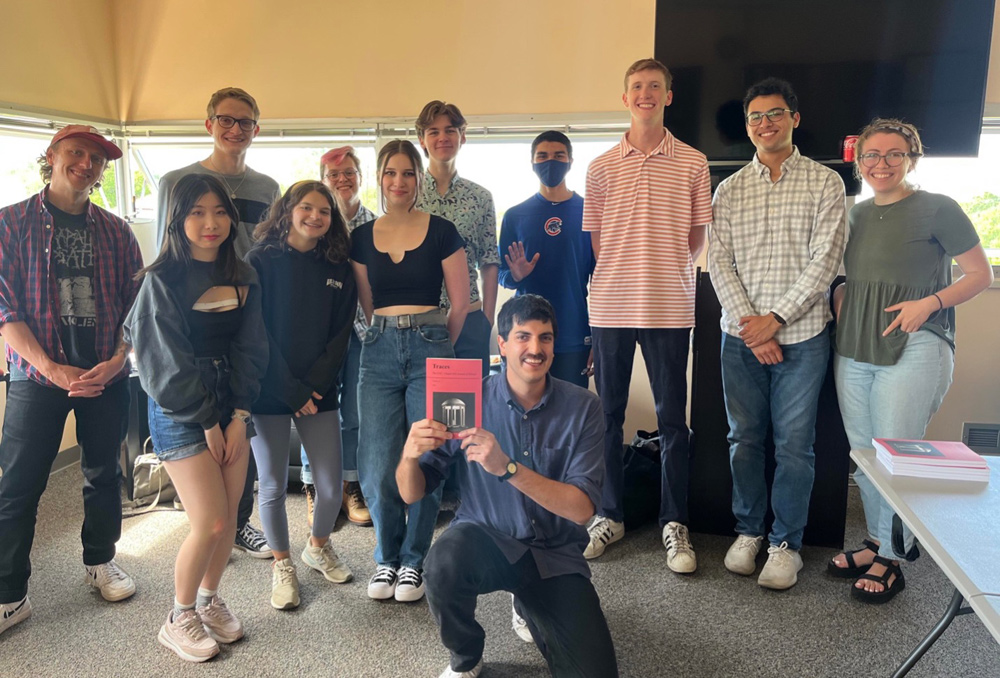Each year, UNC-Chapel Hill history students publish Traces: The UNC Journal of History. First created in 2011 by UNC students G. Lawson Kuehnert and Mark W. Hornburg and supported by the UNC-Chapel Hill Parents Council, the journal features the work of students currently studying history. After over a decade in operation, the award-winning journal – which won Phi Alpha Theta’s prestigious Gerald D. Nash History Journal Prize in both 2013 and 2017 – will be releasing its issue at the end of the Spring semester. For over a decade, Traces has been an important and unique collaboration between graduate and undergraduate students at UNC-Chapel Hill, showcasing the important historical research conducted by undergraduate students.

Traces publishes articles on a diverse range of topics for each issue. This year’s journal will feature articles on medieval history, 19th century history, and the history of psychology. Previous editions have had a similar approach, covering a wide range of geographical areas and thematic topics, including the history of science, gender history, and Indigenous history.
The current Editor-in-Chief of Traces is Javier Etchegaray, a Ph.D candidate studying colonial Southern Chile. He first became involved with Traces in Summer 2021, when the journal was facing difficulties due to the Covid-19 pandemic. “It was unclear whether Traces would be able to publish during the 2021-2022 academic year. In this sense, working as managing editor for Traces put me to the test in terms of thinking about organizational resiliency and working toward team-building. The support and trust that the department places on Traces, while remaining an entirely student-run and autonomous organization, is at the heart of a synergic relation that is one of my favorite elements in this project,” Javier said.
While the Editor-in-Chief role is taken on by a history graduate student, the other editors are mostly undergraduates, ranging from freshmen to seniors. Joining Traces means that they gain not only valuable editing skills, but they also get to work alongside graduate students.
“I got involved in Traces because of my love of history and learning,” Dionejala-Tytionna Q. R. Muhammad, a senior majoring in history and political science, told me. “Through reading the papers that students have submitted, I have opened my mind to new and old stories in history. I am happy to have met the wonderful people of Traces and continue learning more history.”
Joining the editorial board at Traces helped third-year history and economics major Omar Ahmed Farrag discover his love of editing: “I joined Traces because I really like to help explain things to others – and while as an editor I knew I wouldn’t be submitting my own papers to the journal, I did know that I would be helping to polish and promulgate papers written by other historians that would explain unknown and necessary histories that might be of benefit to others. What I’ve enjoyed most as an editor is that I have to push the writers to substantiate their claims, learning to deliver constructive and clear feedback to them, so that, most importantly, they employ analysis that doesn’t lose sight of the people and their histories whom they cover.”
The journal creates a unique collaboration between undergraduate and graduate students that benefits both. Graduate students who are not teaching, for instance, can join Traces as a way to engage with and edit undergraduate work, while undergraduates gain valuable mentorship from the graduate students involved with the journal. As Javier told me, “As graduate students, we tend to work with undergraduates primarily through teaching. Traces has given me a rather unique opportunity to work with UNC’s undergraduates – and their research – in a horizontal, collegiate, and mutually-beneficial manner. Thus, I consider Traces to be a salient example of service to the field that a history graduate student can carry out beyond the purview of professional organizations.”
After working to revitalize the journal after it faced difficulty during the pandemic, Javier is hopeful for its future. “My main assignment with Traces during my time as managing editor has been to ensure the continuity of the journal and reconstitute it as an organization after a COVID-induced lapse. In this sense, I am ready to soon pass this position on and I am excited to see where the journal can go in the future. I would love to see the journal expand the scope of its activities, both thematically and organizationally. While the core of the journal lies in its full-length articles, there is much space for new thematic content to be developed, and this will depend on the creativity of future iterations of the editorial staff. At the same time, I would be elated to see more graduate students working with the journal, both as editors and authors. While most of us dedicate the brunt of our article-writing towards indexed and peer-reviewed journals, I think that a publication such as Traces can allow graduate students to develop more creative styles of writing that otherwise wouldn’t fit with traditional journals.” Traces, then, is a unique opportunity for both undergraduate and graduate students to publish their writing.
For over a decade, Traces has been an important venue for celebrating the research of undergraduate students at UNC, while also encouraging a unique collaboration between graduate and undergraduate students. Some of the previous work from Traces can be found on the Carolina Digital Repository, part of the UNC University Libraries system. Traces will be looking for new editors to join the team during the next academic year and encourages both undergraduate and graduate students to reach out about how to get involved.
-Tess Megginson
